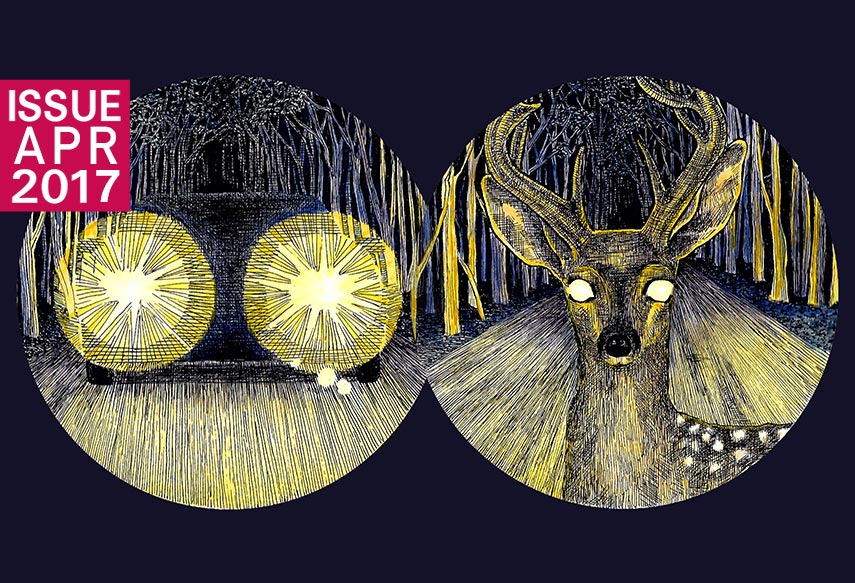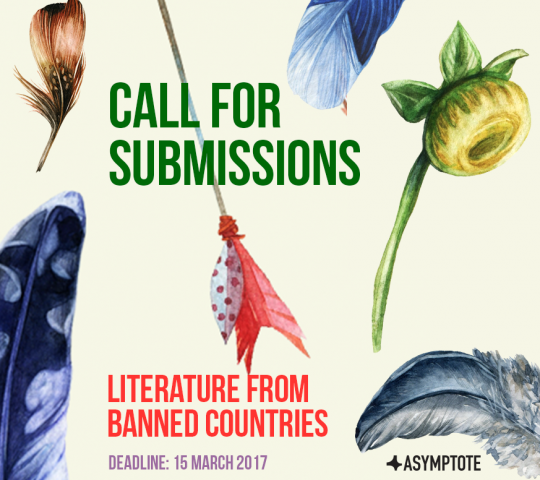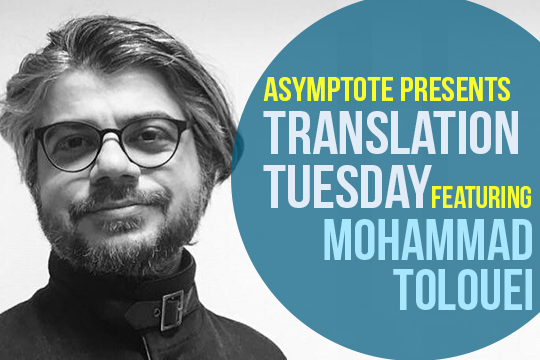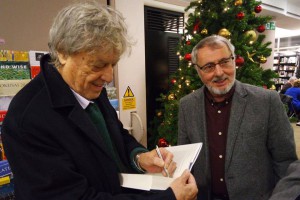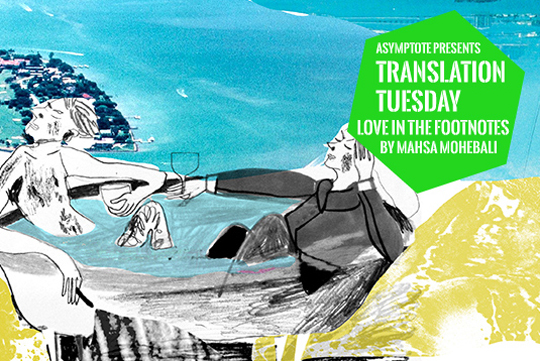Published in 2004 in Tehran, Iran, Love in the Footnotes is Mahsa Mohebali’s second short story collection. Within a year of its publication, the book was in its third print and reaping national prizes before it was banned by the Ministry of Culture and Islamic Guidance. The titular short story, presented here, is concerned with love and its ensuing ennui. The theme of this story is by no means novel. What sets Love in the Footnotes apart from all other “love” stories is its unique development, with most of the story being told in the elaborate intertextual footnotes which weave together an intricate web of films, songs, paintings, and novels from different cultures, at the crossroads of which the protagonist locates herself.
—Maryam Zehtabi Sabeti Moqaddam, translator
In this story, Love happens. Like ivy, love wraps around my lover and me in the lines of this story. My lover and I and several films and stories get so tightly tangled that we become indistinguishable from one another.
I have short auburn hair that falls across my forehead and temples. I weigh 99 lbs. and with heels on, I’m 5’ 5”. I got a BA in literature from The Islamic Azad University. I had been a homebody for a few years before I met my lover at a relative’s Sizde Bedar garden party. My lover has drunk eyes and is a clerk at the Central Bank. He’s tall and very amiable. He has no other remarkable features except that he tends to constantly stroke his mustache. In a corner of the garden, my lover looks at me with his languishing, entreating, and piercing eyes. I avert my eyes from him, look down coyly, and move away. My lover follows me and extends a glass to me. Our eyes meet for a moment. My lover draws me close very gently and fills my glass with a wine-like drink.1
1 See the miniature painting by Mohammad Tajvidi in Khwāja Shams-ud-Dīn Muḥammad Ḥāfeẓ-e Shīrāzī, Hafiz Diwan, Ed. Ghasem Ghani and Allameh Ghazvini, twenty-third edition, Tehran: Asatir Publication, 1995, p. 23, where the man in the miniature painting, with his beseeching eyes, clings to the girl’s robe, offers her a glass of wine while she turns the upper part of her body away from him and avoids his gaze as much as possible. In spite of her apparent apathy, she burns with a latent desire, evident as she watches the man stealthily out of the corner of her eyes. It seems as though the girl in the miniature painting has been looking forward to this moment for years and now that she finally has the opportunity to seduce, despite all the blood running to her cheeks, she tries to appear composed and indifferent. However, the man in the miniature painting doesn’t seem to be concerned at all. As in Hafez’s poem, “Curls disheveled, sweating, laughing, and drunk / shirt torn, singing ghazals, flask in hand,” he just gawks at the girl. He only thinks of getting together with his beloved and isn’t afraid of going down in history as a fool.
My lover and I are sitting in front of the TV, watching Medicopter 117, in our four-hundred-and-thirty-square-foot rental apartment on Hafez Street. At the most critical moment of the episode, I get up, go to my bedroom, put on my red nightgown and stand in front of the TV set, brushing my hair. In response to my lover’s protests, I look at him seductively. He smiles but still follows what’s happening on TV. I unplug it.2
2 See Graham Greene, Quiet American, Trans. Ezatollah Fooladvand, first edition, Tehran: Kharazmi Publications, 1984, p. 143, where Paul asks Fowler, the professional British journalist, what his most profound sexual encounter had been.
Fowler answers the quiet, young American, “Lying in bed early one morning and watching a woman in a red dressing-gown brush her hair.”
The middle-aged Briton had impregnated the scene with all the eroticism he could muster; a scene which he had most likely never experienced with any of his mistresses. But then, this was the only image that came to his exhausted and agitated mind while spending the night in the fortress, with the Vietnamese soldiers and the quiet American, anticipating the Viet Cong skirmishes. Probably, Fowler was not thinking about any of his mistresses in particular, not about Phuong, his Vietnamese phoenix, and not about his English mistress. That image was the culmination of his whole love life.
My lover and I are sitting in a beach café, sipping our cappuccinos. My lover’s wearing a white t-shirt, stuck to his damp body. I’m in a light-green manteau and have put a big white magnolia in one of its buttonholes. The fragrance of the magnolia and that of the cappuccino wafting out from my cup blend with the sea breeze and make me dizzy. I put my fingers on my temples and take a deep breath. My lover looks at me with worried eyes. I ask my lover to tell me the story of the drowning of the young couple again. He says that he has told me the story five times since yesterday and doesn’t feel like telling it any more.3
3 See Marguerite Duras, Moderato Cantabile, Trans. Reza Seyed-Hosseini, first edition, Tehran: Zaman Publications, 1973, p. 89, where Anne Desbaresdes is wearing a décolleté dress and has pinned a big magnolia to her chest. She gets up from the dinner party table quickly and is anxious to go to the beach bar and drink another glass of wine with Chauvin and ask him, for the last time, to tell the story of the young couple. It’s then that, for the first time, she discovers the magical power of magnolia and wine and the incredible and undeniable similarity of wine, magnolia, love, and exasperation. Anne Desbaresdes realizes that, just like when you drink a little wine, the fragrance of magnolia seems to be very innocent at the beginning, but, after some time, it overwhelms your mind and leaves no room for any other feelings or thoughts. This is how she feels at that moment: Intoxicated with wine and the strong scent of magnolia, she can think of nothing but love. Just like the scent of magnolia, love has inundated her mind, which is soon to be overcome by exasperation.
My lover and I are in our four-hundred-and-thirty-square-foot apartment. My lover is lying on the couch, a glass of ice on his chest and a cigarette to his lips. He’s staring at the ceiling and gives curt, nonsensical answers to all my questions. I’m sitting on the sofa and hanging my legs from its arm and thumbing through Art and Decoration magazine irately. I tell my lover not to ash his cigarette on the floor. He ignores me. He looks at the ceiling and flicks his cigarette ash on the floor again. I go stand at the head of the couch, my arms crossed, and look at him resentfully. He smirks while still looking at the ceiling. I yell at him and say that I’m sick and tired of him and the glass he’s always carrying in his hand. My lover puts on his pants, while cursing me under his breath, and buckles his belt. I’m standing in front of the door to block him, telling him that enough is enough; that he’d better stop pretending to be the hero of an American movie who is fed up with his mistress. He shoves me aside abruptly and slams the door.4
4 Don’t refer to happy-ending American movies. Because, unlike Jane Fonda or Julia Roberts, I’m not going to chase down my lover, find him in a park or a bar and bring him back home. As soon as he leaves, I put the opera Salome by Richard Strauss in my player and lie down on the couch and page through Oscar Wilde’s Salome and when Herodias asks Salome to dance for the propitious night, I join her with The Dance of Seven Veils. In the end, when Salome embraces John’s severed head, kissing the lips she couldn’t touch in his life, I take my lover’s photo off the TV set and kiss him on the lips. My sadism and vengefulness at that moment are no less than Salome’s toward John.
My lover and I are lying in the bathtub and are basking in the mild warmth of the water, slowly smoking our cigarettes. My lover rambles constantly and I respond with a dull smile and a duller voice. My eyes are closed and I’m still reminiscing about the previous hours, thinking to myself how my lover would feel if he knew what I was remembering. It gives me chills to even think about it. My lover says I’d better leave the bathtub because I might catch a cold.5
5 See Unfaithful, directed by Adrian Lyne—the scene in which the girl is lying in the tub and suddenly sees the words her naughty lover has written on her belly while she was sleeping. This is definitely the most critical moment in determining her relationship with her husband. Up to that point, it had all been just mischief or even a joke. However, when she gets the sponge and wipes off the heart and dagger sign and her own name, she realizes the magical power of concealment. She has now entered a new phase in her game. Before that, she could confess everything to her husband in a trance or frenzy. But then, she sees the joy and excitement of cheating. That her husband could’ve seen the sign but didn’t awakens the snake of risk-taking that had been lurking dormant in her heart and makes her repeat the dangerous game over and over again.
My lover and I are coming back from the party arm in arm. I’m wearing a dress with an open neckline and my lover is wearing jeans and a t-shirt as usual. We are both singing “Tonight Is the Moonlit Night” a little too loudly. We sometimes stagger and, to keep our balance, cling to each other’s arms, sometimes bursting out laughing. Whenever my lover gets to the word “my lover” in the song, he draws his eyebrows together and points his finger at me with a serious expression. I accompany him in a lower octave.6
6 See the first scene of the movie Who’s Afraid of Virginia Woolf?. In this scene, Elizabeth Taylor and Richard Burton both try to conceal their innermost feelings towards each other. They engage in vigorous banter that might lead to insult and injury if they’re not careful. But oblivion comes to their aid. It helps them change their past memories and sometimes heal their emotional or mental wounds, arising from the death of a child, abortion, or an infidelity that was neither confirmed nor denied.
My lover and I are sitting in our apartment, smoking gloomily. I lie on the couch more wearily and smoke and he lies next to the fireplace more morosely and smokes. Depression, like ivy, ties us together. I say it would be best if one of us left the other because usually in these situations one of the lovers leaves. My lover turns on his side towards me and says he doesn’t feel like wandering the streets and that if I’m tired of the situation, I can leave. I remind my lover that usually men are the ones to leave. Despite my persistence, my lover doesn’t give in and just looks at me with his drunken eyes. I tell my lover that I can no longer smoke, sadly; that I can’t stand his smoking either. My lover takes another puff of his cigarette and says that nothing like smoking exhibits depression so neatly. I go to my bedroom, my upper lip twitching in anger, and play Chopin’s sonata No. 2 in B-flat minor, and lie on the bed, thinking about a couple of trivial matters.7
7 Had Wim Wenders begun his Paris, Texas some scenes earlier, where the couple experiences exasperation, you could’ve seen that film. However, right now you’d better refer to Sonata No. 2 in B-flat minor by Frédéric Chopin, where the notes of the harp remind us of the monotonous rain and Chopin’s ennui on Majorca. When he was at his piano in his sixteenth century villa on the cliff, writing the destructive and exasperating notes of this sonnet, he had one thing on his mind: exasperation, exasperation with love; the inevitable exasperation that follows a long period of lovemaking, cheating, indifference, forgetfulness, argument, intoxication, and languor. It left Chopin with no other choice but to—while listening to the repetitive sound of rain and the waves crashing against the rocks, without taking heed of George Sand’s grumpiness—write the dreary notes that carry a devastating tempest within them. Probably, in the next room, George Sand was writing a story about a lover killing the object of their desire out of exasperation. However, I think if George Sand and Chopin had instead gone to Arles, where Van Gogh painted his beautiful sunflowers, before reaching that intolerable boredom that destroyed their relationship, they would’ve gone so mad that one of them would’ve either killed the other or, as Van Gogh did, cut off a piece of their body.
Translated from the Persian by Maryam Zehtabi Sabeti Moqaddam
Explore the rest of Asymptote’s Summer 2016 issue here.
Mahsa Mohebali (b. 1972) is an accomplished Iranian fiction writer and literary critic. Although she is best known for her critically acclaimed novel Don’t Worry (2008), which won both the Golshiri Foundation’s and the Press Critics’ Best Novel award, she has also penned the novel The Grey Spell (2002) and two short story collections, The Voices (1998) and Love in the Footnotes (2004), the latter of which is now banned in Iran despite being the winner of the Golshiri Foundation’s award for best short story collection. Her works are translated into Swedish, Italian, Turkish, and English and are widely circulated in Iran as well as being adapted for the stage.
Maryam Zehtabi Sabeti Moqaddam is a Ph.D. candidate in Comparative Literature at the University of Massachusetts Amherst. She received her MA in English Literature in 2012 from the University of Tehran where her research focused on black feminist dialogism in the works of Alice Walker and Zora Neale Hurston. She is particularly interested in women, gender, and sexuality studies and the intersection of religion and feminism. She is currently writing her dissertation on the representations of prostitution in Persian and Arab literature. She also aspires to introduce Iranian women writers to Western audiences through translation and criticism of their works.
*****
Read More from Translation Tuesday:



